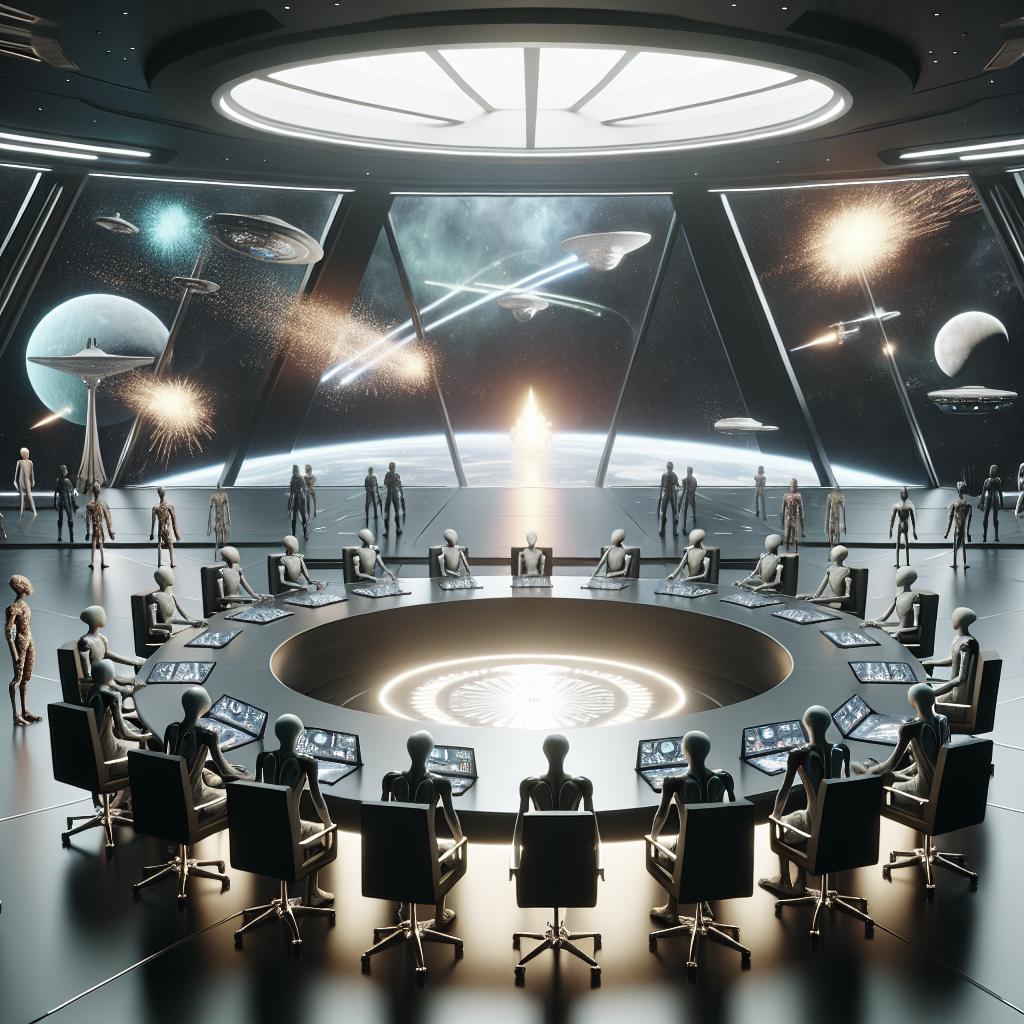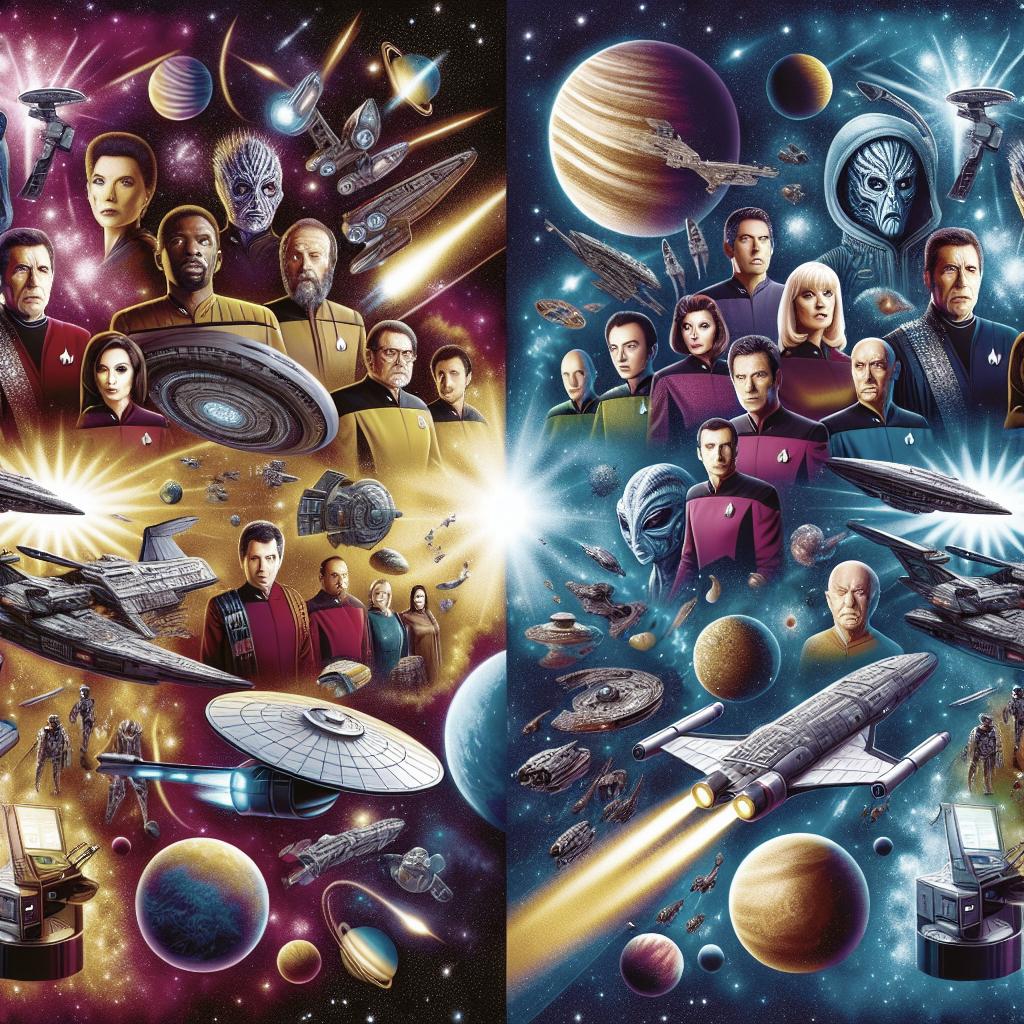“`html
Star Trek Diplomacy and Conflict
The universe of Star Trek has always been a rich tapestry of exploration, philosophy, and diplomacy. Over the years, the series has offered a multitude of episodes delving into complex themes centered on negotiation and conflict resolution. From ethical dilemmas to alien communication barriers, Star Trek has been a platform for social commentary, offering viewers compelling narratives that reflect real-world issues. In this blog post, we explore five pivotal episodes that highlight the principles of diplomacy and conflict across the various Star Trek series, demonstrating how these narratives offer timeless lessons on cooperation, understanding, and moral integrity.
1. “The Measure of a Man” – Star Trek: The Next Generation
In “The Measure of a Man,” Star Trek delves into the philosophical realm of artificial intelligence and human rights. This episode from “The Next Generation” asks the critical question: What constitutes sentience? Commander Data, an android, becomes the focal point of a legal battle to determine if he has the right to choose his own fate. The episode masterfully explores the intersection of technology, ethics, and diplomacy, showcasing the persistent relevance of these themes.
Captain Jean-Luc Picard plays a pivotal role in advocating for Data’s autonomy, reflecting the show’s core values of justice and respect for all forms of life. His defense is a compelling demonstration of advocacy and diplomacy, drawing parallels to contemporary debates on the rights of AI. This episode emphasizes that diplomacy isn’t solely between nations or species but extends to the broader definition of personhood, challenging viewers to rethink ethical boundaries in the age of technology.
2. “Darmok” – Star Trek: The Next Generation
“Darmok” is an iconic episode that showcases the challenges and beauty of communication between different cultures. When Captain Picard finds himself stranded with an alien captain whose language is based on metaphorical references, the story unfolds as a study of patience, cultural exchange, and the effort required to achieve mutual understanding. “Darmok” highlights that true diplomacy often demands stepping out of comfort zones and embracing the complexity of foreign languages and traditions.
This narrative serves as a poignant reminder of the value of persistence in diplomacy, as Picard and the Tamarian captain work together to find common ground. Throughout this journey, viewers witness a profound moment of cultural fusion, where shared experiences and metaphors become the bridge for meaningful communication. “Darmok” reinforces the idea that the path to comprehension is paved with empathy and concerted effort, offering an enduring lesson on intercultural dialogue.
3. “Unification” – Star Trek: The Next Generation
In “Unification,” diplomacy and intrigue are deeply interwoven as Ambassador Spock seeks to bridge the divide between Vulcans and Romulans. This episode is a narrative steeped in political complexity, echoing real-world issues of reunification and reconciliation. Spock’s mission is emblematic of the peace-seeking ethos of Star Trek, illuminating how diplomacy transcends what is spoken, requiring courage and willingness to overcome entrenched hostilities.
This two-part episode also showcases how diplomacy involves risk and sacrifice. Spock’s clandestine efforts in a politically charged environment detail the delicate balance between hope and realism when striving for unity. It offers an allegorical commentary on the challenges faced in real-world diplomatic endeavors while exemplifying the power of determination and the enduring hope for peace among divided peoples.
4. “In the Pale Moonlight” – Star Trek: Deep Space Nine
“In the Pale Moonlight” presents a compelling narrative of moral ambiguity and the ethical dilemmas faced during wartime diplomacy. Captain Benjamin Sisko’s struggle to involve the Romulans in the war effort against the Dominion is fraught with the murky ethical waters of deception and sacrifice for the greater good. This episode stands out for its darker portrayal of leadership and the high stakes of wartime diplomacy where idealism often clashes with harsh realities.
Sisko’s internal conflict and the decisions he makes question the traditional notion of heroism portrayed in Star Trek. The episode boldly confronts viewers with the uncomfortable truth of how desperation can lead to ethical compromise, even for noble causes. “In the Pale Moonlight” serves as a stark reminder of the complexities involved in realpolitik where outcomes sometimes justify questionable means, providing food for thought on the true cost of peace.
5. “Counterpoint” – Star Trek: Voyager
In “Counterpoint,” Star Trek: Voyager embarks on a journey through ethical and diplomatic challenges when the crew must deceive a xenophobic regime to protect telepathic refugees. The episode artfully explores the theme of counterintelligence and the subtleties of negotiation under duress, exemplifying the cat-and-mouse tactics often inherent in diplomacy.
Captain Kathryn Janeway’s interactions with Inspector Kashyk underscore the intricate dance of trust and skepticism. “Counterpoint” masterfully conveys the idea that diplomacy is often marked by complex strategic maneuvering, where alliances are precarious and motivations opaque. This narrative holds a mirror to real-world scenarios where diplomacy requires both strength and subtlety to navigate conflicts and protect fundamental human rights, urging viewers to consider the subtle performances at play in international relations.
Next Steps
| Episode | Series | Themes |
|---|---|---|
| “The Measure of a Man” | Star Trek: The Next Generation | Artificial Intelligence, Ethical Rights |
| “Darmok” | Star Trek: The Next Generation | Cultural Communication, Empathy |
| “Unification” | Star Trek: The Next Generation | Reconciliation, Political Intrigue |
| “In the Pale Moonlight” | Star Trek: Deep Space Nine | Moral Ambiguity, Wartime Diplomacy |
| “Counterpoint” | Star Trek: Voyager | Trust and Deception, Refugee Protection |
Share this:
If you’re inspired by these episodes and the diplomacy lessons in Star Trek, feel free to share this article with fellow enthusiasts or those interested in the interplay of science fiction and real-world politics. Use the social media buttons below to spread the word!
Related
For more insights into how pop culture reflects societal issues, check out our related articles section. Here, you’ll find explorations of other science fiction series and their take on modern-day diplomacy and conflict resolution.
“`


